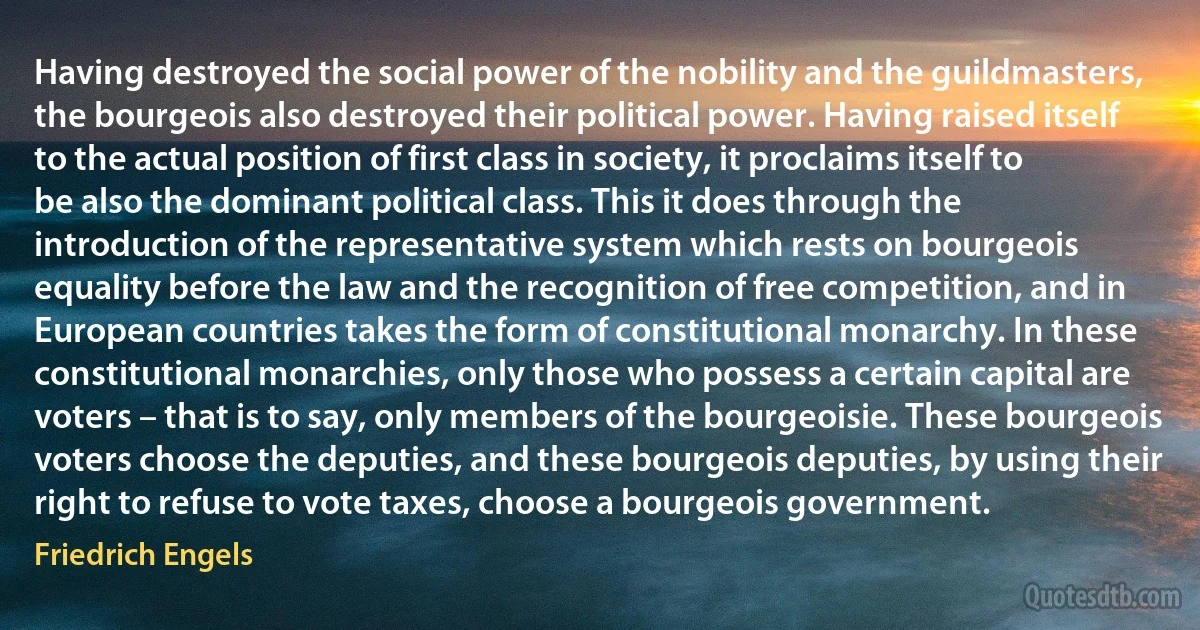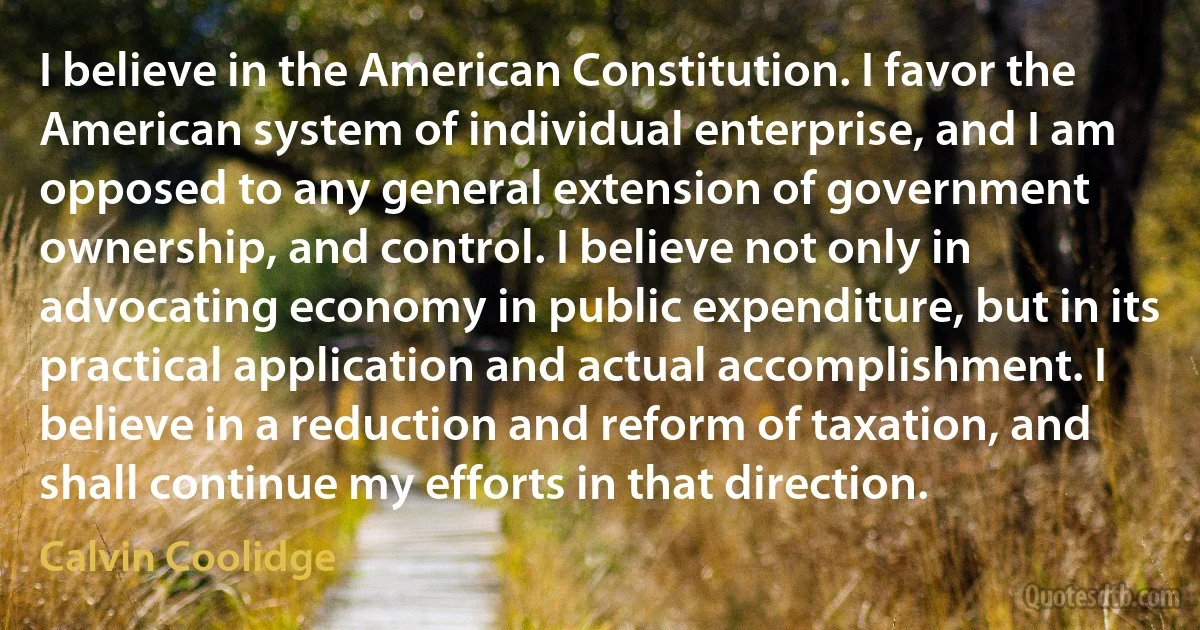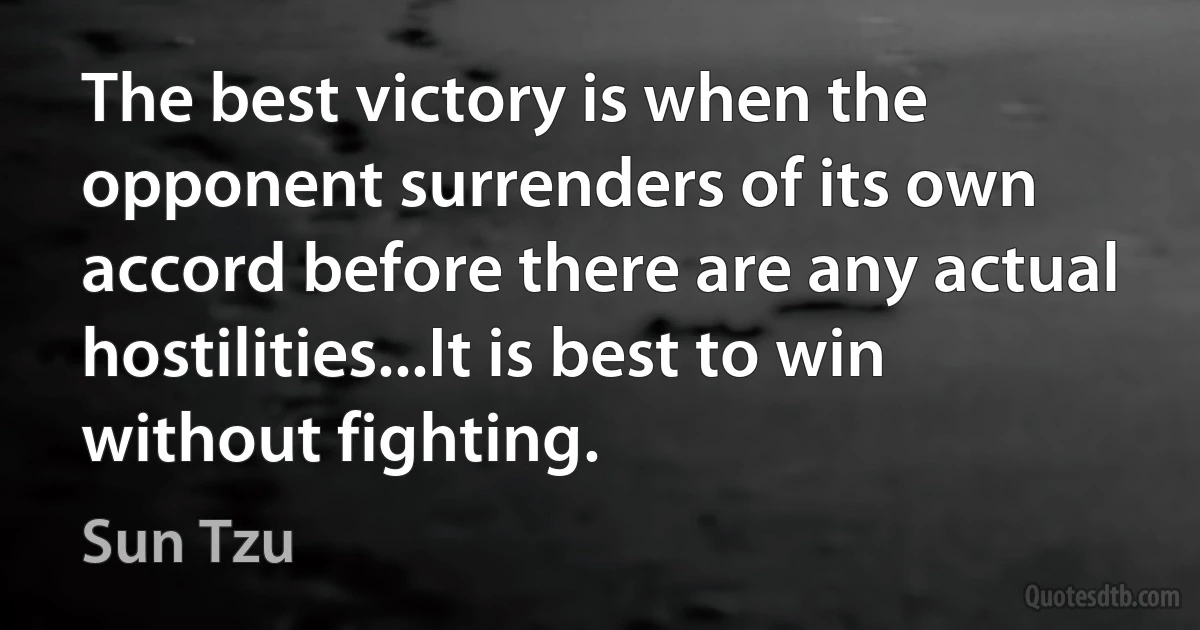Actual Quotes - page 18
The cultural revolution of the later twentieth century can thus best be understood as the triumph of the individual over society, or rather, the breaking of the threads which in the past had woven human beings into social textures. For such textures had consisted not only of the actual relations between human beings and their forms of organization but also of the general models of such relations and the texted patterns of people's behaviour towards each other; their roles were prescribed, though not always written. Hence the often traumatic insecurity when older conventions of behaviour were either overturned or lost their rationale, or the incomprehension between those who felt this loss and those too young to have known anything but anomic society.

Eric Hobsbawm
Every man of the commonalty (excepting infants, insane persons, and criminals) is, of common right, and by the laws of God, a freeman, and entitled to the free enjoyment of liberty. ...liberty or freedom consists in having an actual share in the appointment of those who are to frame the laws and who are to be the guardians of every man's life, property, and peace. For the all of one man is as dear to him as the all of another; and the poor man has an equal right, but more need to have representatives in the Legislature than the rich one. ...they who have no voice or vote in the electing of representatives, do not enjoy liberty, but are absolutely enslaved to those who have votes and their representatives; for to be enslaved is to have governors whom other men have set over us, and to be subject to laws made by the representatives of others, without having had representatives of our own to give consent in our behalf.

Benjamin Franklin
The connection of Islam to Arabism is not, therefore, similar to that of any religion to any nationalism. The Arab Christians, when their nationalism is fully awakened and when they restore their genuine character, will recognize that Islam for them is nationalist education in which they have to be absorbed in order to understand and love it to the extent that they become concerned about Islam as about the most precious thing in their Arabism. If the actual reality is still far from this wish, the new generation of Arab Christians has a task which it should perform with daring and detachment, sacrificing for it their pride and benefits, for there is nothing that equals Arabism and the honor of belonging to it.

Michel Aflaq
A science fiction writer is-or should be-constrained by what is, or logically might be. That can mean simple fidelity to facts (which, in science, are always more important than theories-though Lord knows the two help shape each other, undermining the convenient, complacent separation of observer and observed). To me it also means heeding the authentic, the actual and concrete. Bad fiction uses the glossy generality; good writing needs the smattering of detail, the unrelenting busy mystery of the real.

Gregory Benford
Spinoza is a highly systematic thinker, but still I do not think I can offer a single key for all things Spinozistic. Personally, one thing which got me excited about Spinoza is his philosophical boldness, i. e., his willingness to pursue philosophical exploration as far as he can, making very little concessions to commonly accepted beliefs and norms. In terms of content, I take his attempt to conceive of God, nature, and ethics in a manner that is free from anthropomorphism and anthropocentric illusions as one of the deepest elements of his philosophical thinking. A closely related issue is his advocacy of actual infinity (an issue that has been mostly neglected in recent literature). Finally, the very attempt to do philosophy systematically (rather than rely on fragmented and disassociated intuitions) and transparently (laying bare the logical structure of his arguments) commands my respect, indeed admiration.

Baruch Spinoza
Neokantianism represents in the last analysis nothing but a certain academic line of thought, which has supplied us with a better knowledge of Kant and a useful literature of educated people. Agnosticism, on the other hand, on account of its diffusion among the people, is an actual symptom of the present condition of certain social classes. The socialists would have good grounds for believing that this symptom is one of the evidences of the decadence of the bourgeoisie. It certainly stands in marked contrast to the heroic devotion to truth shown by the thought of the precursors of modern history, such as Bruno and Spinoza, or to that conventional assertiveness, which was typical of the thinkers of the 18th century, until the classic German philosophy gradually came upon the scene.

Baruch Spinoza
On every hand we hear that the quality of immigration is not what it used to be. This is unwisely construed as meaning that we must withdraw our faith in mankind and raise rigid barriers always. Such a confession would declare the weakness of our institutions and undermine our faith in the principles on which the government is founded. The continuance of our faith is not interrupted by our intense conviction that there is no room in our midst for those whose direct purpose is political, social, or economic mischief, and whose presence jeopardizes the physical or moral health of the community. Certain laws of supply and demand take care, in normal times, of the coming and going of the alien. But it may be that today conditions abroad are so intolerable that men and women run chances in coming over without knowing the actual conditions they must face. Wise immigration laws would deal with such a pressure.

Calvin Coolidge
The consolidations need to be carried out with due regard to public interest and to the rights and established life of various communities in our country. It does not seem to me necessary that we endeavor to anticipate any final plan or adhere to an artificial and unchangeable project which shall stipulate a fixed number of systems, but rather we ought to approach the problem with such a latitude of action that it can be worked out step by step in accordance with a comprehensive consideration of public interest. Whether the number of ultimate systems shall be more or less seems to me can only be determined by time and actual experience in the development of such consolidations.

Calvin Coolidge
Some years ago I found myself in discussion with a friend who entertained the notion that the general tendency of things in this world is towards equilibrium, the result of which would be peace and blessedness to the human race. My notion, was that equilibrium meant... death. No motive power is to be got from heat, save during its fall from a higher to a lower temperature, as no power is to be got from water save during its descent from a higher to a lower level. Thus also life consists, not in equilibrium, but in the passage towards equilibrium. In man it is the leap from the potential through the actual to repose.

John Tyndall
There can be no question that such a gap existed in early Christian art. What has been praised in it as deliberate simplification, masterly concentration or conscious idealizing and intensifying of the actual is in reality often just incapacity and poverty, just a helpless inability to render natural forms correctly, and a primitive bungling of the drawing.This clumsiness and ungainliness of early Christian art is not mastered until after the Edict of Toleration, when it became the official art of state and court, of aristocratic and educated circles.

Arnold Hauser
I'm often asked by students how a photographer gets over the fear and uneasiness in many people about facing a camera, and I just say that any sensitive man is bothered by a thing like that unless the motive is so strong and the belief in what he's doing is so strong that it doesn't matter. The important thing is to do the picture. And I advise people who are bothered by this to cure it by saying to themselves, what I'm doing is harmless to these people really, and there's no malevolence in it and there's no deception in it, and it is done in a great tradition, examples of which are Daumier and Goya. Daumier's Third Class Carriage is a kind of snapshot of some actual people sitting in a railway carriage in France in eighteen-something.

Walker Evans
We had a very respectable force, as to numbers; between eight and nine thousand, rank and file, upon the ground; but of these we attempted to select a particular corps to possess ourselves of the enemy's lines, partly by force, and partly by stratagem; but w r e could not make up the necessary number that was thought sufficient to warrant the attempt, which was five thousand, including the Continental and State troops. This body was to consist of men, who had been in actual service before, not less than nine months. However, the men were not to be had, and, if they could have been found, there was more against it than for it. Colonel Laurens was to have opened the passage by landing within the enemy's lines, and getting possession of a redoubt at the head of Easton's beach. If we had failed in the attempt, the whole party must have fallen a sacrifice, for their situation would have been such that there was no possibility of getting off.

Nathanael Greene
For this is our central human problem: that we are almost constantly the victims of our emotions, always being swept up and down on a kind of inner-switchback. We possess a certain control over them; we can 'direct our thoughts' -- or feelings -- in such a way as to intensify them. This is certainly our most remarkable human characteristic: imagination. Animals require actual physical stimuli to trigger their experience. A man can retreat into a book -- or a daydream -- and live through certain experiences quite independent of the physical world. He can even, for example, imagine a sexual encounter, and not only experience all the appropriate physical responses, but even the sexual climax. Such a curious ability is far beyond the power of any animal.

Colin Wilson
What so impressed me on that first reading was the self-containedness of Tolkien's world. I suppose there are a few novelists who have created worlds that are uniquely their own -- Faulkner, for example, or Dickens. But since their world is fairly close to the actual world, it cannot really be called a unique creation. The only parallel that occurs to me is the Wagner Ring cycle, that one can only enter as if taking a holiday on a strange planet.

Colin Wilson
I can't really imagine war. I can imagine having to fight some swarm of zombie machines or snarling horde of posthuman fast-burn wreckage or whatever, but not two or more actual human societies actually fighting each other. I'm aware that people did that, before history, before the Moon, but it seems irrational. One side would have to believe they had something to gain from destroying or damaging the other, which just doesn't make sense: it runs up against the law of association. And more to the point, each individual on any side would have to believe that they benefited from participating even if they died, which doesn't make sense either. I suppose kin selection could make genes prevalent that made people vulnerable to that kind of illusion, but that only makes sense with animals that don't have foresight. Even crows aren't that stupid, at least not the ones that can talk. You have to get down to ants and such like before you see that kind of genetic mechanical mindlessness.

Ken MacLeod
Yes? . . . Oh, I'm very sorry to hear that. Please convey him our best wishes for a speedy recovery. But the president did ask me to pass this message informally as soon as possible; I may say he feels very strongly about the matter. Of course, not knowing if the rumor is well founded, we didn't want to handle it on an official level . . . Yes, I would be obliged if you could make sure the ambassador is told at the earliest opportunity. Tell him, please, that any attempt to nominate Austin Train for the Nobel Peace Prize would be regarded as a grave and-I quote the president's actual word-calculated affront to the United States.

John Brunner



